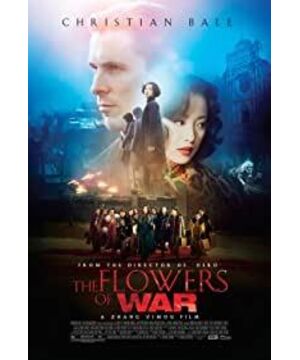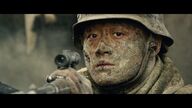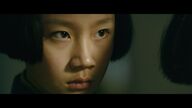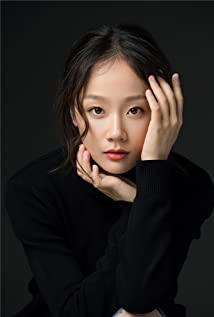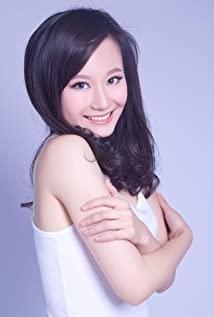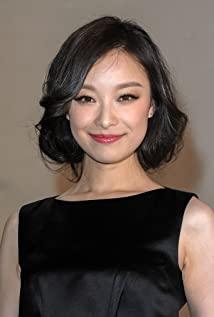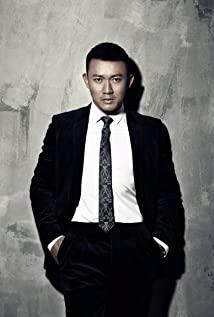1. Adapt the role of Shujuan's father and adapt the relationship between Shujuan and Yumo.
2. Remove the original main character, Father Engman, and add a new character - John
3. Delete Lao Gu and reduce the age of George Chen 4. There is actually another change in
the handling of the image of Chinese soldiers in the novel
The narrative perspective of "My Aunt Shujuan" is "My Aunt Shujuan", and the point of view of "Shujuan" is directly adopted in the film. Such a change is easier to empathize with the audience and is more suitable for the narrative method of the film. The novel is a work from a purely female perspective. Shujuan was chosen as the protagonist because Shujuan's father had a relationship with Yumo, so Shujuan's mother had to go abroad with her father. Her father forgot about Yumo, who knew that Nanjing fell during this time, so there are two kinds of hatred in Shujuan's heart - one is hatred for leaving her parents, and the other is hatred for Yumo. And as a girl who has just entered puberty, she also has a wonderful feeling about her female identity and female body-she is curious about her own body, but even hates herself for being as "dirty" as these prostitutes 's body. So far, I think Shujuan's character in the novel is very full. But why does the movie change this relationship? I guess it's probably because Zhang Yimou didn't want to tell a story about "hatred". Although the female students he created had various contradictions, he insisted that they were pure and ignorant. But I feel that maybe the feeling of hatred mixed with disgust at the beginning turns into understanding and gratitude, and this setting brings more impact.
Shujuan in the movie is a bit too "heroic". It seems that no matter what she does, she stands up and is righteous. She doesn't want to leave Nanjing with her father and insists on advancing and retreating with her classmates. When she saw Yu Mo and others hiding in the cellar, she resolutely led the Japanese soldiers upstairs. She saved the danger when the little mosquito accidentally ran out, and she even led everyone to jump off the building in the end. And why she has such a brave and strong character, we don't know, she even has such a cautious father! This makes the character seem too flat. And in the novel, Shujuan has been peeping at Yumo because she is full of hatred for Yumo, but she can't help being curious, so Yumo in her eyes is dissolute, but beautiful. She even wanted to leave a scar on Yumo's face with a soldering iron for her mother. But Shujuan's feelings for Yumo in the movie seem too single, and there is no difference from other female students, so she can't get a convincing explanation for why she keeps peeping at Yumo. The world seen from her eyes seems to be seen from a female perspective, but because it does not penetrate into the hearts of the characters, this female perspective seems a bit unfamiliar. This directly led to little difference between the fantasy and reality that finally appeared in Shu Juan's eyes, and the deliberate slow motion made people somewhat contradictory.
The film breaks the delicate connection between girls and women, which makes Yumo's image a little weaker. In order to make up for this and strengthen the conflict and drama of the whole film, the film adds a brand new character, John. Compared with Father Ingman, who has always been just and selfless in the novel, John is a more complex character and even becomes the protagonist of the entire film. John's role is mainly in the following two points.
First, due to the deletion of Lao Gu and the change of George Chen's age, some of the "second-rate" aura of these two people who were incompatible with serious wars was transferred to John, so that "the blasphemy of the church - the sanctity of the church" , "The cruelty of war - the numbness of living" is preserved, and he even bears the Chinese soldiers' desire for prostitutes and carnal desires. It can be said that he almost bears the "inferiority" of all Chinese men in the novel. ".
Second, the change in John's character makes this character full of character arcs, and his willpower and desire have also become a major driving force for the progress of the story. It can be seen that the director and screenwriter have high hopes for "John". He "leads" the transformation of Thirteen Hairpins as the first character in the film to transform, and they strive to set him up as a multifaceted character, adding to him a contradictory set of conscious desires and Unconscious desire - I want to survive, and I want to protect the female student. So the key to this character is how the character realizes the transformation, how his unconscious desire overcomes conscious desire and becomes the ultimate conscious desire. However, as everyone has criticized, the director and screenwriter's handling of this transition has not been satisfactory. The intention of their setting is as follows:
First, when the Japanese soldiers rushed in, John's first reaction was to be afraid and want to hide in the closet. But he found himself wearing a priest's clothes, so he realized he had nothing to fear. Then he heard the voices of Japanese soldiers chasing the girls, and he finally made a decision to protect the girls.
Why can he make the transition from "protecting himself" to "protecting others"? The explanation that the film struggles to give in the second half is that he has a daughter who has passed away, if she were alive, as old as those schoolgirls. Does this explanation give people enough motivation to make the transition? Looking at the reaction of the majority of the audience, the answer is no. Not only the lack of motivation, but I think there may be an important problem in that the placement of the explanations is not reasonable. Like the well-known "foreshadowing", a more clever way to deal with a question may be to put the answer before the question, so that when the audience is surprised and asks "why", they will immediately go back to the front to find the answer to the question. This treatment not only makes the story design more sophisticated, but also satisfies the audience's psychology - they find the answer to the question themselves. Putting the answer at the back will only make the audience passively wait for the explanation - unfortunately, the film is not about the art of interpretation, but the show, you show the audience a world, have confidence in them, and let them understand for themselves.
In order to express the truth of the character (that is, the nature of the character) in a deeper way, the director and screenwriter set another option for him - when he went out to find cardamom and pandan, he met his friend who was about to flee. At this time, he was faced with the same choice - self-protection or saving others. Obviously, the strength of this scene is still somewhat insufficient. In fact, when John saw the naked female corpses on the street before, he was accumulating strength for this choice, but such savings still seemed a little insufficient. Because John was very reluctant to come out looking for cardamom, he could just walk away with such an opportunity. I think maybe he will meet his friends after he sees the tragic deaths of Cardamom and Pandan. This choice will be more difficult and more believable - because he sees their tragic deaths and finally feels the cruelty of the Japanese. , so he will stay firmly to protect the female student.
The adaptation of the image of Chinese soldiers is beyond Zhang Yimou's control. For some reason, negative depictions of soldiers are not allowed on the big screen. Therefore, as a director, Zhang Yimou may have some shortcomings, but he understands the Chinese audience very well and is very smart.
He understands what everyone wants and what XX is not allowed to do. In a literary word, he is very good at dancing with shackles. I believe that he will not be ignorant of the little things I said above, but why he adopted the existing adaptation method is because he wants to summarize the whole story under his own personal style, get approval, and win everyone's love. He's good at telling a captivating story, and he knows how to keep pace -- his story swings between laughter and horror. "The alternation between tension and relaxation is the pulse of life", so "The Thirteen Hairpins of Jinling" brings you the feeling of "laughing with tears". The "Xianglan" he added is a very Zhang Yimou-style character. She is full of female characteristics, with a female temperament, showing us Zhang Yimou's cleverness. The image of Shujuan's father "traitor" is a very common gray image in movies in recent years. (There are similar characters in "Ip Man", "Nanjing! Nanjing!" and "October Siege").
But sometimes, this "smart" Zhang Yimou makes people miss the deleted Zhang Yimou in "One and Eight".
View more about The Flowers of War reviews


